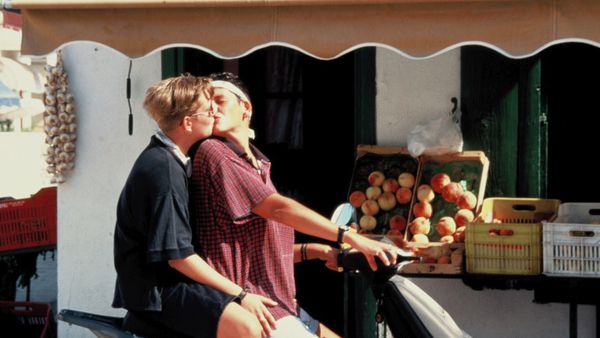Eye For Film >> Movies >> Lesvia (2023) Film Review
Lesvia
Reviewed by: Amber Wilkinson

Tzeli Hadjidimitriou’s fascinating documentary begins with her own recollections of August 1980 and the first time she visited Eressos, on her home island of Lesvos (Lesbos) and the lasting impact it had on her as she embraced her own gender identity as a young lesbian. But the personal and the specific soon open out into a panoply of voices that charts 40 years of the lesbian community whichgrew up in the village from both their perspective and that of the local residents. The film deservedly won several awards when it premiered at Thessaloniki International Documentary Film Festival and is also screening at BFI Flare.
Hadjidimitriou hadn’t travelled very far, although emotionally she notes that the freedoms she found in Eressos were a world away from where she grew up. Others, however, had come half way around the globe, drawn by the history of lyric poet Sappho - who was born there and from whom we get the English word “sapphic” thanks to her writing about love between women. Although the island had been a draw, to a degree, for decades, it was in the late Seventies and early Eighties when it became a destination for gay women.

The director has a history of photography, so she draws on the wealth of her own personal archive, as well as that of many others, to immerse us in the time period, also including overlays of snippets from her own diaries, which reveal her naivety at first. “I met seven girls,” she writes, “six of them perverted” - noting this is the word her mother would have used. As she documents her own coming-of-age other voices join her in a chorus of memories about the place. When they first started to arrive, there was no tourism to speak of and many of the women simply set up camp on the beach, where they had the freedom to be themselves. “The energy was revolutionary,” one notes.
Initially, the locals were welcoming, even if they weren’t always aware that the community was quite sexually specific. In a mark of the good humour that laces this film, one older Eressos resident recalls, “I was wondering, ‘Why aren’t their husbands coming?’” to a gale of laughter from her friends. Hadjidimitriou charts not just the ebb and flow of the lesbian community in Eressos but the attitude of the residents towards them. Things became tense in the Nineties, as the women became more “provocative”. “We were generally disrespectful,” one admits.
But the waves of tourism also brought money with them, which was welcomed by the local economy, even if feathers were ruffled as some of the women tried their hand at entrepreneurship themselves. This leads to what someone describes as “a financial truce”, although the film indicates a much deeper connection and understanding that has built up down the years between the indigenous residents and the incomers - many of whom now call the village home.
The director also documents how, as the years have worn on, the world itself has changed, opening up to gender diversity in ways that mean women no longer have to escape to a place with others in order to live their lives as they wish. But if there is a note of nostalgia, this is also a hopeful and positive film about a community that remains open and vibrant, with younger women noting the importance of seeing older versions of themselves. An assured feature debut that’s confident enough to explore the sometimes complex dynamics at work while celebrating the community at its heart.
Reviewed on: 21 Mar 2024














